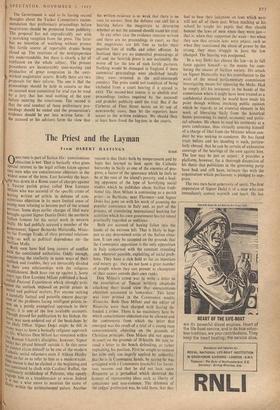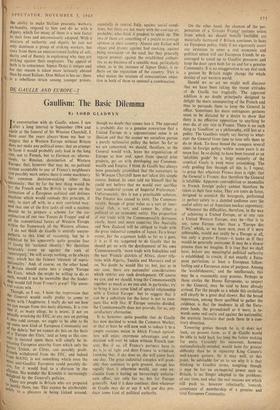The Priest and the Layman
From OSBERT HASTINGS
ROME.
OBJECTING is part of Italian life: conscientious obiection is not. That is basically what gives special interest to the legal actions taken against two men who are conscientious objectors in the Widest sense of the term. Last Saturday the hear- Sing was down in a Rome court of charges against a Tuscan parish priest called Don Lorenzo Milani who was accused of the specific crime of having written art article in defence of con- scientious objection in its more limited sense of Young men refusing to become part of the armed services. Some days earlier charges of libel were brought against Signor Danilo Dolci, the northern Italian famous for his social work in western Sicily. He had publicly accused a member of the government, Signor Bernardo Mattarella, Minis- ter for Foreign Trade, of close personal relations Withmas well as political dependence on—the Sicilian Mafia.
Both men have had long careers of conflict with the constituted authorities. Oddly enough, considering the similarity in some ways of their outlook and troubles, they are inexorably divided to their own relationships with the religious establishment. Both have run up against it. Some Years ago Don Lorenzo Milani published a book called Pastoral Experiences which strongly criti- 61'ised the outlook imposed on parish priests in social and political matters. For anyone seeking a. carefully factual and patently sincere descrip- tion of the problems facing intelligent priests in- tent on a purely evangelical approach to their duties, it is one of the few available accounts. bhough passed for publication by his bishop, the ih"k was soon ordered out of the bookshops by e Holy Office, Signor Dolci might be felt in „s 'anY ways to have a basically religious approach t"", life. Whereas Don Milani has remained within
, Roman Church's discipline, however, Signor °lei has placed himself outside it. in this sense
cannot claim himself to be one of the modern Catholic social reformers even if Aldous Huxley Wept so far as to refer to him as a modern saint. one reason is that he clashed at the beginning and has continued to clash with Cardinal Ruflini, the reactionary archbishop of Palermo, who openly it"gards him as a troublemaker or worse. Indeed boi,s not a wise move to' mention the name of 'c' within the archiepiscopal palace. Another
reason is that Dolci both by temperament and by logic has learned to look upon the Catholic hierarchy in Sicily as one of the enemies of pro- gress, a factor of the ignorance which he feels to be at the root of the island's poverty, and a lead- ing opponent of the type of horrifying social studies which he publishes about Sicilian tradi- tional life. Don Milani is continuing as a parish priest—in Barbiana, near Florence—and Signor Dolci has gone on with his work of arousing the popular conscience in Italy and, as part of the process, of stimulating international backing for activities which his own government has (at times) practically regarded as seditious.
Both are accused of having fallen into the hands of the extreme left. That is likely to hap- pen to any determined critic of the Italian situa- tion. It can only be accepted on the grounds that the Communist opposition is the only opposition in Italy concerned with the constant revealing and, wherever possible, exploiting, of social prob- lems. They have a rich field as far as injustices and misery go: they do not have a great number of people whom they can present as champions of their causes outside their own ranks.
Don Milani's crime was to write a letter to the association of Tuscan military chaplains attacking their stated view that conscientious objection amounted to 'cowardice.' This letter was later printed in the Communist weekly Rinascita. Both Don Milani and the editor of Rinascita were then charged with having de- fended a crime. There is no machinery here by which conscientious objection can be allowed and the controversy from which the letter first emerged was the result of a trial of a young man conscientiously objecting on the grounds of Christian principle. Don Milani did not appear in court on the grounds of ill-health. He sent in- stead a letter to the bench defending, or rather explaining, his position. First he sought to remove the taint only too eagerly applied by authority, that he is in Communist hands, by saying he was arraigned with a Communist journalist for fortui- tous reasons and that he did not look upon Rinascita as a periodical which deserved the honour of representing ideas such as liberty of conscience and non-violence. The dilemma of the judges' profession was, he told them, that they had to base their judgment on laws which were still not all of them just. When teaching at his school he taught his pupils that they should honour the laws of men when they were just— that is, when they supported the weak—but when they saw that certain laws were unjust, such as when they sanctioned the abuse of power by the strong, they must struggle to have the law changed. The hearing was postponed.
In a way Dolci has chosen the law—in its full force against himself—as the means for com- bating the abuses of Sicilian society. His attack on Signor Mattarella was his contribution to the work of the mixed parliamentary commission investigating means for opposing the Mafia. Had he simply left his testimony in the hands of the commission where it might have been treated as a confidential document, he would have made his point though without invoking public opinion which 'he regards as an essential element in his work of liberating Sicily from the historical bonds preventing its social, economic and politi- cal advance. He chose to read his testimony at a press conference, thus virtually assuring himself of a charge of libel from the Minister whose con- duct he was seeking to condemn. He has faced trials before and his standing is such, particu- larly abroad, that he can be certain of exhaustive coverage of the hearings of the case against him. The law may be just or unjust: it provides a platform, however, for a thorough discussion of his thesis that politicians in the governing party have had, and still have, intimate ties with the organisation which parliament is pledged to sup.: press.
The two men have generosity of spirit. The first impression of Signor Dolci is of a man who can immediately convey warmth and heart. He has
the ability to make Sicilian peasants, workers, ex-bandits, respond to him and do so with a dignity which for many of them is a new factor in their lives and unconsciously adopted. With a mixture of authority and dignity he can not only dominate a group of striking workers, but coax from them an unaccustomed feeling of soli- darity and of fluency in explaining why they are striking against their employers. The appeal of both is to conscience. Signor Dolci is unique and for this reason is taken more seriously abroad than by most Italians. Don Milani is less so: there is a rebellious strain among younger priests,
especially in central Italy, against social condi- tions, but there arc not many with the courage or, probably, who think it prudent to speak up. The two of them are something of a puzzle to average opinion in their country. Almost any Italian will object and prutest against bad cooking, against being overtaken on the road, but they generally regard protests against the established authori- ties as no business of a sensible man, particularly when, .as in the instance of Signor Dolci, it re- flects on the reputation of the country. This is what makes the mixture of conscientious objec- tion in both of them so unusual a combination.







































 Previous page
Previous page